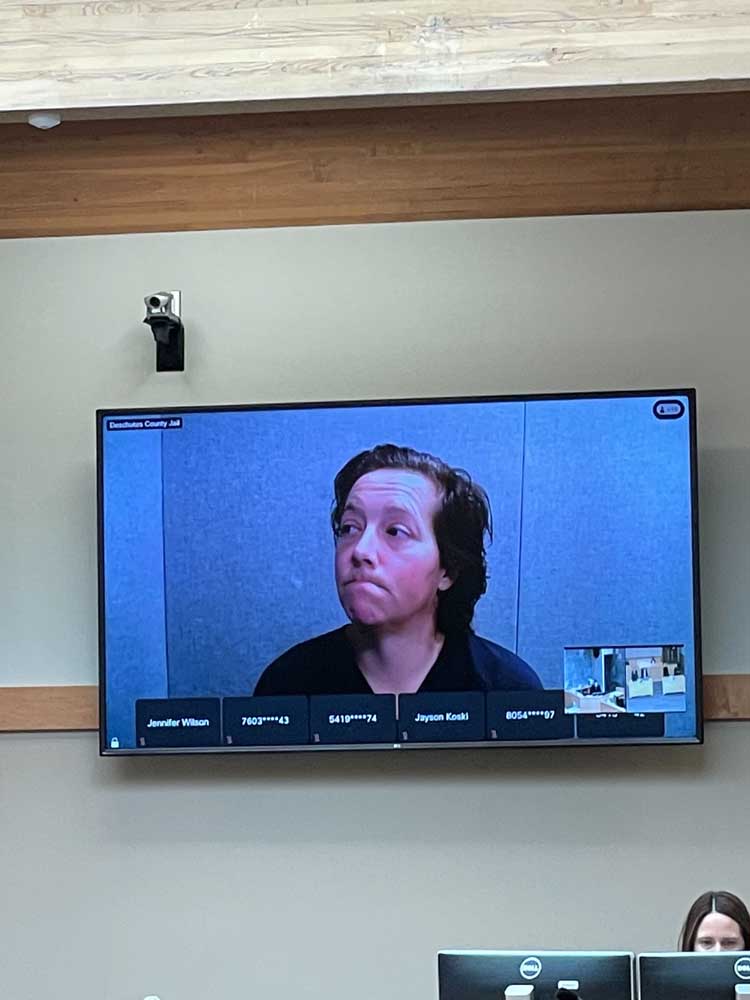Bend dog-mauling death: Dog owner sentenced
Published 12:56 pm Friday, December 29, 2023

- Jessica McCleery, seen here in a video during a November hearing in Deschutes County Circuit Court, was sentenced to three years in prison on Friday for her role in a fatal dog mauling.
Joseph Taylor Keeton once had big dreams and four daughters who loved him.
But last summer, his life met a brutal end.
Trending
Keeton, 56, was severely mauled by three dogs in the Juniper Ridge homeless encampment and died at St. Charles Bend on July 19. Last week, Jessica McCleery, 38, took responsibility for the attack that killed him, pleading guilty to criminally negligent homicide and maintaining a dangerous dog.
On Friday, she was sentenced to three years in prison in a case that “highlights the vulnerabilities that homeless people face,” his daughter, Kansas Keeton, wrote in a statement, which a prosecutor read during the sentencing hearing Friday at Deschutes County Circuit Court.
“Our dad’s death was a deeply traumatizing event and still weighs like iron in our minds and hearts,” Kansas Keeton wrote.
Dogs in fatal attack at Juniper Ridge had bitten others
Trending
Deschutes County Deputy District Attorney Rosalie Beaumont read Kansas Keeton’s statement in court, describing Keeton’s life.
He was an “unusually intelligent” and charismatic man, his daughter recalled. He could play musical instruments — often piano — without formal training. He had “skyscraper dreams” of being a Hollywood director. He loved animals and playing with his four daughters.
“Our happiest memories as children were with our dad,” Kansas Keeton wrote, “how happy he was to see us, how affectionate and playful he was.”
But years ago, Keeton’s life spiraled.
He struggled with depression and his parents divorced. He hurt his back and was prescribed 80 mg of oxycodone daily, his daughter wrote.
His mental health declined as he turned to methamphetamine, drifted from his family and, eventually, became homeless.
“And he didn’t deserve what happened to him,” Kansas Keeton wrote. “Nobody does.”
McCleery admitted to leaving her three pit-bull/bull-mastiff mix dogs unattended and unleashed the night of July 19 in the homeless encampment, despite knowing they had attacked other people and killed animals.
By pleading guilty, McCleery — who declined to speak in court — forfeited the right to own animals and loses her three dogs, D.J., Littlez and Precious, which will remain at BrightSide Animal Center in Redmond.
“This is a very horrific case, horrific way to die, and Joe Keeton was a valuable member of our society,” the deputy district attorney said in court. “He is not here. And him not being here any more, the state believes, was entirely preventable.”
Friday’s hearing provided few additional facts of the case.
Olivia Miller, McCleery’s defense attorney, acknowledged the pain inflicted upon Keeton’s family, but noted that her client tried to save him, calling 911 and providing aid as police headed their way.
“She didn’t behave as someone who wanted or understood that this would happen if she behaved the way that she did,” Miller said.
Central Oregon homeless need dogs, advocate say. Taking care of them is the hard part.
She said the case was unique because “we’re here due to inaction, not some overt act or desire behind what happened.”
She added, “I think that’s important for (McCleery) to acknowledge to move on and heal as well.”
Police spent hundreds of hours trying to find people to speak about McCleery’s dogs around Juniper Ridge, a 1,500-acre area of publicly owned land on the northeast outskirts of Bend, where McCleery and Keeton lived and knew each other.
During the investigation, the Deschutes County Sheriff’s Office learned that three people had been hospitalized after being attacked by McCleery’s dogs — facts that prompted prosecutors to accuse her of being negligent.
Deschutes County Presiding Judge Wells Ashby, too, noted McCleery’s efforts to help Keeton, saying that she directed police to the location. He added, “There aren’t street signs and street lights out there.”
McCleery knew Keeton and “meant him no ill will, certainly did not aim for him to be injured, and certainly did not aim for him to be killed,” Ashby said.
However, he added, “I think it’s important to remember the person who suffered the greatest loss here, which was (Keeton), and acknowledge the horrific manner of his death.”
Kansas Keeton added: “Our dad suffered far worse than Jessica’s punishment will be, and we feel that it is just.”
Kansas Keeton’s statement included details about how, as her father experienced homelessness, he advocated for others.
He befriended people providing support through shelters and churches, helping out in kitchens and playing piano during sermons. He shared his food with those who were hungry and gave the clothes off his back. He would engage people in conversations about homelessness and was known to change minds.
“He was baffled and angry at how society could abandon sick people outside the reaches of a loving community,” she wrote, “but was fiercely protective of those who were just as vulnerable as he was.”
Kansas Keeton wrote that she hopes her father’s story will inspire kindness and compassion toward people experiencing homelessness.
“A smile and a dollar may not mean much to you, but it means the world to somebody who has nothing,” Kansas Keeton wrote. “We love you so damn much, dad.”








